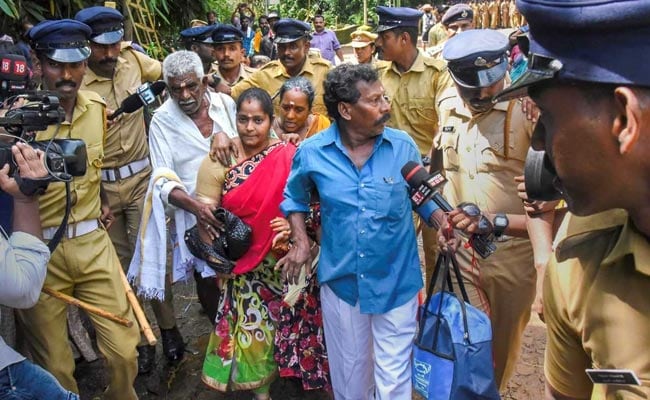We were reporting from the Pamba base camp, 4.6 km from the Sabarimala temple where entry of women of reproductive age is now allowed after the Supreme Court's order, when suddenly some 20-30 people started shouting and running after a tractor that was pulling a flatbed trailer covered with a white cloth.
Instinctively, the cameraperson and I started running towards them, fearing there could be women in the direction they were heading.
To our surprise, some policemen were hiding in the flatbed. They were being taken towards the temple without alerting the protesting devotees. The protestors did not let them proceed and started shouting slogans.
Then they turned their anger at us.
While I was reporting from a spot 200 metres towards the temple from the Pamba base camp, the protestors surrounded us, and told me that women of my age should not be here. But I had every right to be here after the Supreme Court verdict.
As I continued to report amid the shouts and the threats, I didn't feel intimidated by them at all. Then they shifted their attention to the cameraperson, SP Babu, and jostled him into stopping the shoot. But Babu kept the camera live as long as he could. The men blocked the camera and forced us to retreat to the base camp.

Protesting devotees surround NDTV's Sneha Mary Kosy near Pamba
Behind our back, we could hear them shout slogans about victory as we walked towards Pamba.
What happened to me was nothing compared to the intensity of the attacks that some women journalists, 20 km away in the other base camp Nilakkal, had to endure. All hell broke loose there.
The car of Republic TV reporter Pooja Prasanna was surrounded by a hundred angry, young men and vandalised; Pooja was attacked with sticks.
CNN-News18's Radhika Ramaswamy was inside her car when the protesting devotees started throwing things at her. She was in tears.
Saritha S Balan of The News Minute was pulled out of a bus that was going to Pamba and kicked on her back.
All these attacks happened in front of policemen.

Police escort Madhavi of Andhra Pradesh and her family members after she was heckled by the protesters while they were walking to the hilltop temple in Sabarimala (PTI)
I have seen people saying on social media that media organisations must have sent male journalists to cover the opening of the Sabarimala temple. I strongly disagree with those comments.
In a situation as this, I and other women journalists get immense pride to report what is happening on the ground accurately. It is our job. There is no question of gender here.
It's my job as the Kerala bureau chief of NDTV to report news without gender coming in the way.
Sneha Mary Koshy is NDTV's Kerala Bureau Chief.
Disclaimer: The opinions expressed within this article are the personal opinions of the author. The facts and opinions appearing in the article do not reflect the views of NDTV and NDTV does not assume any responsibility or liability for the same.


